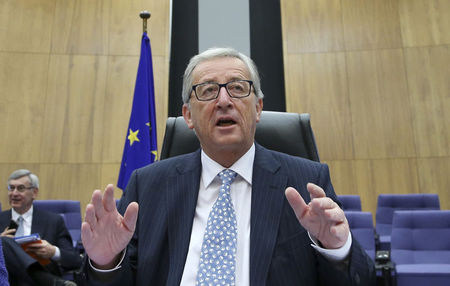By Alastair Macdonald
BRUSSELS (Reuters) - The European Commission faces a censure motion in the European Parliament next week after Eurosceptic lawmakers united to condemn the role its president, Jean-Claude Juncker, played in Luxembourg tax schemes.
A lack of support for the censure motion from other parties, less than a month after the legislature endorsed the appointment of Juncker's 28-strong executive team, makes it highly improbable that his critics will win the two-thirds majority required to force the Commission from office. Such an event would be unprecedented.
Parliament has no power to sanction individual members of the executive. An alliance of Eurosceptics, including Britain's UK Independence Party, the French National Front and Italy's 5-Star Movement gathered 76 signatures to meet the threshold of 10 percent of the 751-seat chamber to put the motion on the agenda.
It stated that Juncker, who was Luxembourg's prime minister for two decades until a year ago, was directly responsible for tax policies which are now under investigation by the Commission for unfairly attracting multinational businesses.
Euro zone countries have had to slash spending and hike taxes to counter government debt crises in the past few years, heightening public resentment of schemes that help wealthy individuals and companies to pay less tax.
"(It) is intolerable that a person who has been responsible for aggressive tax avoidance policies serves as president of the European Commission," the motion read.
Juncker has said he wants a level playing field in corporate taxation. The censure motion, brought by parties that oppose EU oversight over states, said "tax sovereignty" was vital for competition but Luxembourg's policies were not fair competition.

Eurosceptics won a bigger voice in parliament at elections in May amid growing disillusionment with economic austerity and perceived failures of European Union administration. They have complained of a "grand coalition" of mainstream parties backing Juncker and trying to suppress minority views in parliament.
(Additional reporting by Barbara Lewis; Editing by Ruth Pitchford)